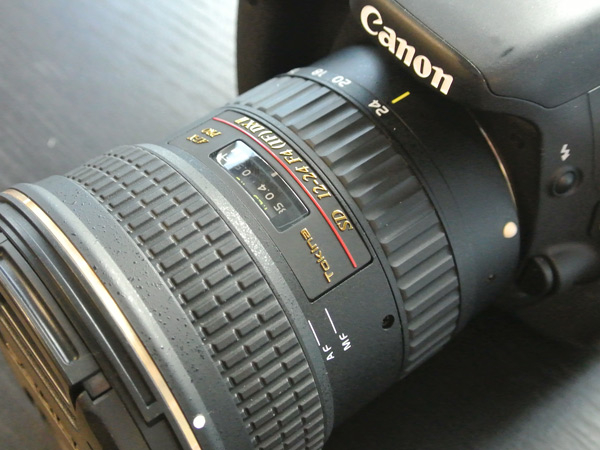 Why You Can Trust CNET
Why You Can Trust CNET Tokina AT-X Pro 12-24mm f/4 IF DX II review: Tokina AT-X Pro 12-24mm f/4 IF DX II
A wide-angle zoom lens designed for Canon and Nikon APS-C cameras, the Tokina 12-24mm offers good value and performance in a well-built package.
Design and features
Any photographer in the market for a wide-angle lens knows that the Canon, Nikon and Sony lenses of this world are all on the pricey side. Third-party lens manufacturers, like Tokina, are there to fill the gap with reasonably priced glass that covers desirable focal lengths.
The Good
The Bad
The Bottom Line
The Tokina 12-24mm f/4 lens is an ultra-wide zoom with consistent maximum aperture throughout the focal-length range. It looks and feels very well made, with focusing and zoom rings possessing a pleasing level of resistance when turned. Along with a bayonet hood and a lens cap, the lens is available in both a Canon and Nikon mount. For Nikon cameras without a built-in AF motor, like the D3100 or earlier, there is an AF motor included on the Nikon version. The lens is designed specifically for APS-C cameras, rather than their full-frame counterparts.

The Tokina 12-24mm f/4 on our test camera, the Canon EOS 600D. It sits neatly on the camera body, but is a touch lens-heavy, with a lightweight body like the 600D.
(Credit: CBSi)
It's not as wide as some lenses available for APS-C cameras — such as the Canon EF-S 10-22mm — but it still offers a very decent wide-angle range. This lens has a focus clutch, which means that to activate manual focus, you need to pull the front focusing ring back towards the body. Distance markings are indicated in both feet and metres in the top lens window. The 12-24mm uses a filter thread of 77mm, which doesn't rotate when screwing in a filter. All focusing mechanisms are internal, and the lens doesn't extend at all when changing the focal length.
The focus clutch moves back and forth on the front of the lens element to switch between automatic and manual focus.
(Credit: CBSi)
As a refinement over the previous 12-24mm lens from Tokina, this new version (denoted with a II marking) has a multi-coating to help reduce ghosting and flaring.
Performance and image quality
On lighter bodies (we tested it in conjunction with the Canon EOS 600D), the lens sits comfortably on the front, and is just a touch lens-heavy.
A demonstration of the zoom reach of this lens at 12mm (left) and 24mm (right).
(Credit: CBSi)
For a lens this wide, it's inevitable that there will be distortion, particularly at the extreme wide end. At 12mm it's noticeable, but it presents no challenge that post-processing can't meet. Chromatic aberration is quite prominent when viewing at 100 per cent magnification, and there is a degree of halation present that can make the image look rather soft, again at full magnification.
Vignetting isn't noticeable in outdoor and everyday shots, but in studio situations, there's noticeable darkening of the corners, particularly the top left corner, when shooting at 12mm throughout the aperture range. Colour rendition is pleasing, and doesn't shift much at all from our standard testing lens, a 50mm f/1.8.
Autofocus is reasonably quick and nearly silent, though on occasion it can lock on to the wrong target and be totally out of focus with anything in the frame. It doesn't feel as responsive as native Canon lenses, particularly the 10-22mm. The focus clutch on the lens feels solid and moves freely.
Bokeh is not necessarily an important factor for anyone shooting with a wide-angle lens — lucky, because it's not all that pleasing on this lens. Also, the lens struggles when shooting macro, as its minimum focusing distance is 30cm. Again, no-one expects a wide-angle lens to do effective macro, so this is no surprise.
When shooting wide open at f/4, the lens exhibits an impressive degree of sharpness at the centre of the frame, particularly when compared to our reference point of the Canon EF-S 10-22mm lens. It does, however, drop off slightly towards the bottom of the frame. Flaring is kept under control quite well, although having not tested the previous version of this lens, we're unable to provide a comparison.
Image samples
Exposure: 1/60, f/4, ISO 100 | Exposure: 1/60, f/4, ISO 100 |
Exposure: 1/100, f/4, ISO 200 | Exposure: 1/640, f/4, ISO 200 |
Conclusion
A wide-angle zoom lens designed for Canon and Nikon APS-C cameras, the Tokina 12-24mm offers good value and performance in a well-built package. Be prepared to engage in some post-processing work to eliminate a few of its flaws, however, like sporadic chromatic aberrations and slight distortion at the wide end.


